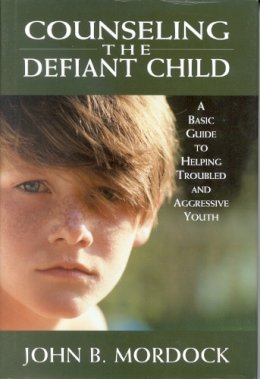
Stock image for illustration purposes only - book cover, edition or condition may vary.
Counseling the Defiant Child
Mordock, John; Van Ornum, William
€ 126.94
FREE Delivery in Ireland
Description for Counseling the Defiant Child
Hardback. The defiant child presents a challenge to the therapist's patience as well as to his skill. To help clinicians grow in both, this skillfully written volume by Dr. John B. Mordock draws on more than twenty-five years of experience with troubled children and their families. Num Pages: 227 pages. BIC Classification: JKSN2; JMC; MJW; MMH. Category: (G) General (US: Trade). Dimension: 235 x 163 x 21. Weight in Grams: 535.
The defiant child presents a challenge to the therapist's patience as well as to his skill. To help clinicians grow in both, this skillfully written volume by Dr. John B. Mordock draws on more than twenty-five years of experience with troubled children and their families. The author begins with the premise that children are children first and troubled children second, framing the work with a clear understanding of developmentally appropriate behaviors. Principles are illustrated with wonderful concrete examples, so that a beginning therapist can find the answers to such questions as what to do when the child continually subjects you to verbal abuse, or when the child won't leave the counseling room. Aggressive and defiant youngsters have made noncompliance a way of life. Conversations with such children, specifically aimed at counseling them, will be of significant help to social workers, teachers, and therapists. This is a guidebook for adults who seek to help children who are depressed, defiant, timid, or otherwise troubled. It is wise, readable, humorous, and filled with practical tips. Most importantly, it offers hope without false promises.
Product Details
Format
Hardback
Publication date
2001
Publisher
Jason Aronson Inc. Publishers United States
Number of pages
227
Condition
New
Number of Pages
227
Place of Publication
Northvale NJ, United States
ISBN
9780765702609
SKU
V9780765702609
Shipping Time
Usually ships in 15 to 20 working days
Ref
99-15
About Mordock, John; Van Ornum, William
John B. Mordock, Ph.D., is a clinical child psychologist in independent practice. A Diplomate of the American Board of Professional Psychology, Dr. Mordock is co-author of Crisis Counseling with Children and Adolescents and six other books, as well as numerous professional publications.
Reviews for Counseling the Defiant Child
While recent psychological literature emphasizes family therapy, most counselors spend a great deal of their time counseling children alone. Mordock helps them to consider whether individual or family therapy is the best route for a particular child, and offers proven principles and methods for them to help troubled children in a variety of situations. He provides numerous counseling dialogues between an adult and a child, many of them interchanges with aggressive-defiant children, the most difficult to counsel.
Adolescence Magazine
Mordock uses his wealth of experience to produce a well-written, well-organized, and easy-to-read volume that focuses heavily on understanding and producing therapeutic verbal encounters with children.
Contemporary Psychology
John Mordock has written a book that will be helpful to parents, relatives, foster, and adoptive parents—those who will be in a position to refer a troubled child for counseling, and the many persons ranging from psychologists, school staff, nurses, child care agency workers, and others who, as part of their work, assist troubled children every day.
William Van Ornum, Ph.D., Marist College
Adolescence Magazine
Mordock uses his wealth of experience to produce a well-written, well-organized, and easy-to-read volume that focuses heavily on understanding and producing therapeutic verbal encounters with children.
Contemporary Psychology
John Mordock has written a book that will be helpful to parents, relatives, foster, and adoptive parents—those who will be in a position to refer a troubled child for counseling, and the many persons ranging from psychologists, school staff, nurses, child care agency workers, and others who, as part of their work, assist troubled children every day.
William Van Ornum, Ph.D., Marist College
